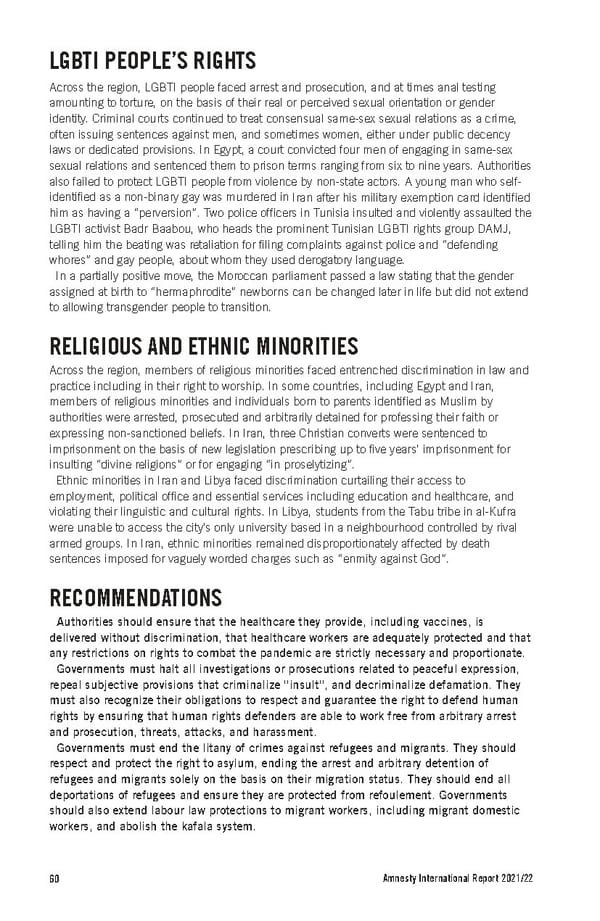LGBTI PEOPLE’S RIGHTS Across the region, LGBTI people faced arrest and prosecution, and at times anal testing amounting to torture, on the basis of their real or perceived sexual orientation or gender identity. Criminal courts continued to treat consensual same-sex sexual relations as a crime, often issuing sentences against men, and sometimes women, either under public decency laws or dedicated provisions. In Egypt, a court convicted four men of engaging in same-sex sexual relations and sentenced them to prison terms ranging from six to nine years. Authorities also failed to protect LGBTI people from violence by non-state actors. A young man who self- identified as a non-binary gay was murdered in Iran after his military exemption card identified him as having a “perversion”. Two police officers in Tunisia insulted and violently assaulted the LGBTI activist Badr Baabou, who heads the prominent Tunisian LGBTI rights group DAMJ, telling him the beating was retaliation for filing complaints against police and “defending whores” and gay people, about whom they used derogatory language. In a partially positive move, the Moroccan parliament passed a law stating that the gender assigned at birth to “hermaphrodite” newborns can be changed later in life but did not extend to allowing transgender people to transition. RELIGIOUS AND ETHNIC MINORITIES Across the region, members of religious minorities faced entrenched discrimination in law and practice including in their right to worship. In some countries, including Egypt and Iran, members of religious minorities and individuals born to parents identified as Muslim by authorities were arrested, prosecuted and arbitrarily detained for professing their faith or expressing non-sanctioned beliefs. In Iran, three Christian converts were sentenced to imprisonment on the basis of new legislation prescribing up to five years’ imprisonment for insulting “divine religions” or for engaging “in proselytizing”. Ethnic minorities in Iran and Libya faced discrimination curtailing their access to employment, political office and essential services including education and healthcare, and violating their linguistic and cultural rights. In Libya, students from the Tabu tribe in al-Kufra were unable to access the city’s only university based in a neighbourhood controlled by rival armed groups. In Iran, ethnic minorities remained disproportionately affected by death sentences imposed for vaguely worded charges such as “enmity against God”. RECOMMENDATIONS Authorities should ensure that the healthcare they provide, including vaccines, is delivered without discrimination, that healthcare workers are adequately protected and that any restrictions on rights to combat the pandemic are strictly necessary and proportionate. Governments must halt all investigations or prosecutions related to peaceful expression, repeal subjective provisions that criminalize “insult”, and decriminalize defamation. They must also recognize their obligations to respect and guarantee the right to defend human rights by ensuring that human rights defenders are able to work free from arbitrary arrest and prosecution, threats, attacks, and harassment. Governments must end the litany of crimes against refugees and migrants. They should respect and protect the right to asylum, ending the arrest and arbitrary detention of refugees and migrants solely on the basis on their migration status. They should end all deportations of refugees and ensure they are protected from refoulement. Governments should also extend labour law protections to migrant workers, including migrant domestic workers, and abolish the kafala system. Amnesty International Report 2021/22 60
 Amnesty International Report 2021/22 Page 59 Page 61
Amnesty International Report 2021/22 Page 59 Page 61